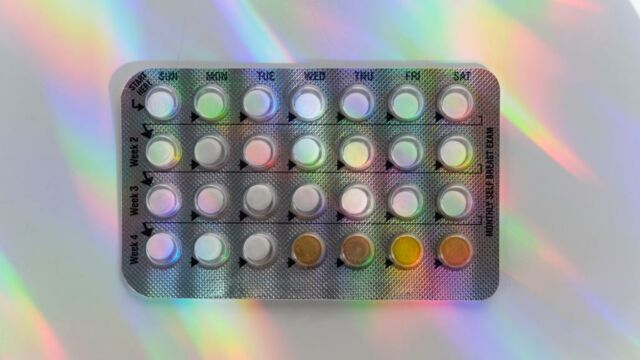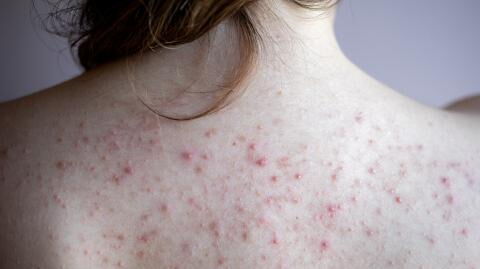For many of us, acne doesn’t mean the odd pimple popping up as a prologue to a week of bleeding; it’s a chronic, stubborn condition that makes us uncomfortable in our own skin.
Discover our latest podcast
Anyone who has suffered from endless breakouts and constantly red, painful or itchy skin has probably tried every drugstore product in existence to soothe the trauma. But, if your acne is hormonal, chances are it can’t be silenced with a benzoyl peroxide spot treatment.
More often than not, hormonal acnesufferers require prescription treatments such as retinoids, antibiotics or even birth control. Before you go chasing down your doctor for a prescription, let’s look at how birth control targets acne and what types of birth control are best for the job.
How does birth control treat acne?
Birth control works by affecting the body’s hormone levels; that’s why it can suppress ovulation and other hormone-related conditions such as acne or endometriosis.
Essentially, cells in the skin and hair follicles contain receptors that are sensitive to hormones and can cause the cells to produce specific changes.
For example, the hormone estrogen can impact the skin by reducing oil production and allowing the hair to grow for longer. Meanwhile, androgens - male hormones like testosterone - prompt the skin cells to produce more sebum. This sebum contributes to clogged pores and, ultimately, acne.
The estrogen and progestin found in some forms of birth control can suppress acne-causing androgens and increases the amount of sex hormone binding globulin (SHBG) which stops androgens from entering the skin and hair follicles. Dr Melissa Kanchanapoomi Levin, MD, told Byrdie:
When the hormone profile is more male dominant, a couple of skin changes occur: The sebaceous glands (the glands that make oil) become more active, there is an increase in dead skin cells, and the skin cells become stickier. This environment is perfect for acne flares! Some women are more sensitive to circulating testosterone and develop hormonal acne.
What types of acne can birth control treat?
There a six different types of acne, including:
- Whiteheads
- Blackheads
- Papules
- Pustules
- Nodules
- Cysts
However, it’s what causes these types of breakouts that determines the kind of treatment necessary. Usually, teenage inflammatory acne involving papules and pustules can often be treated with a course of antibiotics. But, those suffering from hormonal or cystic acne may require birth control as a treatment.
Signs of hormonal and cystic acne include:
- Cyclical acne (peaking around the time of menstruation)
- Acne located mainly around the lower face and jawline
- Acne extending past your teen years
- Acne consisting more of nodules and cysts
Who can take birth control for acne?
While birth control is a good solution for people with hormonal acne, not everyone is a good candidate for this type of treatment. To be considered for a birth control prescription, you generally need to be at least 14-15 years old and have started menstruation. Doctors will also screen patients to make sure they don’t have any pre-existing medical conditions that could make taking birth control dangerous, including:
- Migraines with a visual aura
- A history of blood clots
- High blood pressure
- Smoking habits
- Being over 35-years-old
- Liver or gallbladder disease
- History of breast or uterine cancer
In people who experience migraines with auras, blood clots or high blood pressure, the risk of having a stroke can be increased with taking birth control. The same applies to women over the age of 35, especially if they smoke.
Meanwhile, those suffering from liver or gallbladder disease may find that some birth control methods could worsen their condition. Those with a history of breast cancer risk the chance of cancer returning when taking birth control.
Best types of birth control for acne
There are many types of birth control, but not all of them can treat acne. If your doctor decides that birth control is the best option to treat your skin, you’ll most likely be greeted with a script for the combined hormonal birth control pill.
Combined hormonal birth control pills often contain a mix of both estrogen and progestin, and an analysis of over 30 studies have concluded that this type of birth control is effective in treating acne. Less is known about which brands and doses of combined hormonal birth control pills work best. But, 17 of the studies observed found that acne was reduced more with hormonal birth control containing anti-androgenic progestin than ones containing androgenic progestin.
On the other hand, mini pills or progesterone-only pills can’t be used to treat acne and can even worsen the condition.
Currently, the FDA has approved four types of birth control pills to treat acne:
- Yaz (drospirenone/ethinyl estradiol)
- Ortho Tri-Cyclen (ethinyl estradiol/norgestimate)
- Beyaz (drospirenone/ethinyl estradiol/levomefolate)
- Estrostep FE (ethinyl estradiol/norethindrone acetate/ferrous fumarate)
Unfortunately, not all of these brands of birth control are available in the UK, so a doctors appointment will be required to discuss which brands treatments will be best.
How long does it take for birth control to treat acne?
While acne can take over the face in a matter of days, treating it can often be a long and drawn-out process. Birth control pills can help to cure acne, but it is considered a long term treatment and can often take three to six months to take effect.
What are the side effects of birth control for acne?
The possible side effects of using birth control to treat acne are the same as using it for contraception. Most types of birth control have similar side effects, but changing the dose or brand can often ease symptoms. Common side effects of birth control include:
- Nausea
- Weight gain
- Lighter periods
- Sore and swollen breasts
- Mood changes
- Spotting between periods
- Decreased libido (sex drive)
More severe side effects associated with birth control include gallbladder or liver disease as well as heart failure. These conditions often manifest in the form of stomach pain, chest pain, shortness of breath and blurry vision. If you find yourself experiencing any of these symptoms, please see a healthcare provider immediately.















